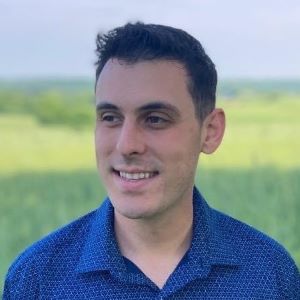
Michael B
Managing Full-Time College: Michael B
In my first two years of high school, academics came easily to me and I was an honors student. As a member of the National Honor Society, National Technical Honor Society, and student council, my future looked bright. I made plans to major in computer science in college.
However, during my junior and senior years of high school, I started struggling academically and losing interest in the hobbies I had always enjoyed. I began experiencing extreme anxiety and alternated between sleeping hours on end and being unable to sleep for days at a time. My teachers, family, and friends began to notice something was different, but they did not know what it was. At the time, no one in my life realized this was the beginning of my journey into the world of mental illness.
I barely managed to graduate from high school. Fortunately, due to my previous academic accomplishments, I had already been accepted at the College of the Ozarks with a full scholarship.
In 2016, during my first semester of college, I experienced my first delusions and feelings of paranoia. I thought my teachers were against me. I believed subliminal messages were being broadcast from the TV and radio. I had trouble falling asleep and couldn’t wake up in time for classes. When I did homework, I found myself reading the same text over and over without comprehension.
Unable to concentrate, I skipped my classes and isolated myself in my room. I couldn’t understand why schoolwork had become so difficult. I failed my classes and returned home that summer confused and discouraged.
Over the course of the next several months, my mental health continued to decline. I wasn’t sleeping and I experienced cognitive issues. I began having visual, auditory, and tactile hallucinations: hearing voices and experiencing extreme fear. I was no longer able to study or work. My parents sought treatment for me, and in November 2016 I was diagnosed with schizoaffective disorder.
We tried numerous medications and treatment options for improved cognition and anxiety control: clean eating, gluten and dairy free foods, supplements, vitamins, and holistic and naturopathic medicine. Nothing worked. Finally, in my desperate and confused state, I believed that more medication might work better to relieve my symptoms, and I took a two-week supply of medicine all at once. This resulted in me being picked up by ambulance and hospitalized with multiple organ failure. This was my fourth and last hospitalization.
After 13 failed antipsychotics, numerous mood stabilizers and antidepressants, and four hospitalizations, my parents finally found a doctor who was unwilling to give up on me. This doctor started me on a rarely used medication called clozapine, for treatment-resistant patients.
On clozapine, my concentration and memory began to improve. I began to experience less anxiety and fear and I started to enjoy old hobbies like reading. Over several months, the delusions, hallucinations, and voices faded away. As these schizophrenia symptoms began to fade, my cognitive abilities slowly improved. I enrolled in community college and each semester proved a little easier than the last.
I have now been in meaningful recovery for five years. I am back at my previous college, which is three and a half hours away from home, and I am living in a dorm on campus again. I work 15 hours a week in the campus library. I have made friends and am enjoying college life. My grades are excellent.
In 2019, I founded a NAMI peer support group in my hometown for people living with mental illness (NAMI stands for National Alliance on Mental Illness). In 2020, I started a NAMI on-campus support group for the Metropolitan Community College of Kansas City. I am a board member of NAMI of Greater Kansas City and the program director for all NAMI on-campus groups in Kansas City colleges. I have been arranging Zoom meetings, and people from all over the United States attend virtually. I was featured on the PBS Documentary, “The Hidden Pandemic.”
I recently changed my major from computer science to social work. After graduation, I want to work in the mental health field. I believe that people living with mental illness need help, hope, and understanding, and I want to work with patients to improve their lives. I want them to know that recovery is possible with the right medication and that they are not alone.
I hope that through sharing my story, more young people will seek appropriate treatment so they can rebuild their lives as I have.
Disclaimer: Schizophrenia Survivors are not representatives of the CURESZ Foundation.

